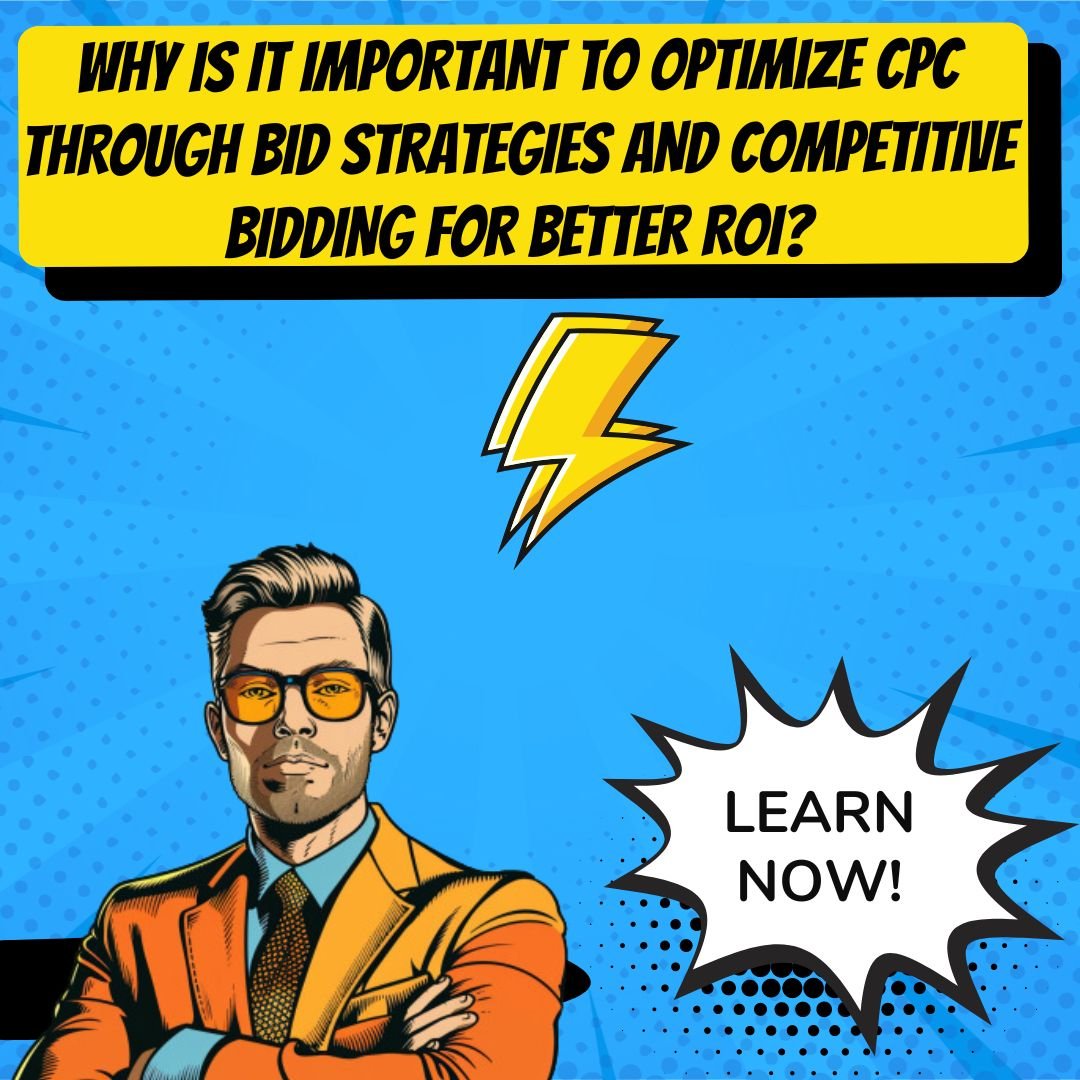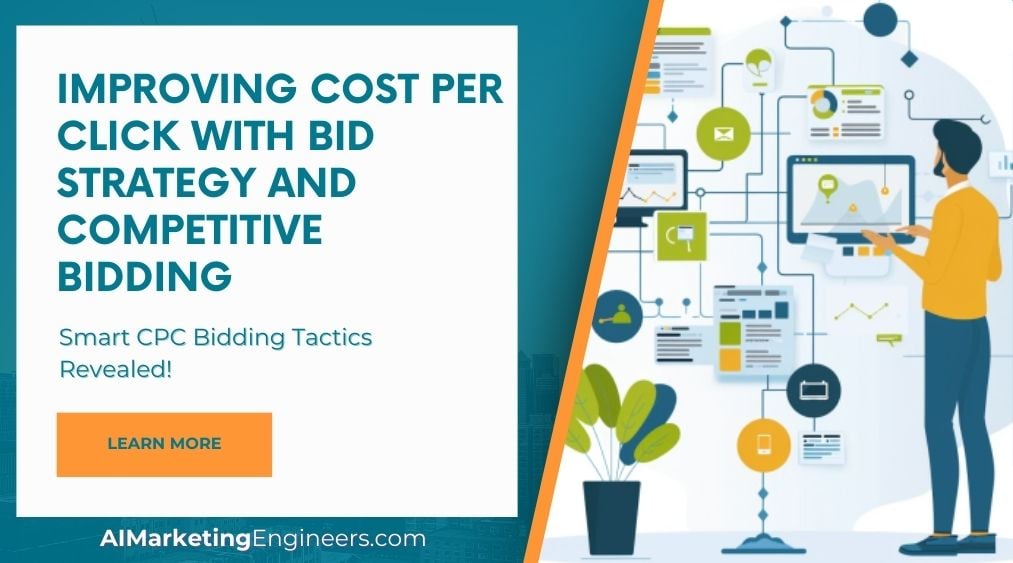Key Takeaways
✅ Optimize Bid Strategy: Fine-tuning your bid strategy could unlock potential savings and improve ad performance. By selecting the right strategy—whether it's aiming for more conversions or a better return on ad spend—companies have reduced their CPC by an average of 20%. Automated strategies like Google's Maximize Conversions or Target CPA are becoming vital tools for savvy marketers.
✅ Analyze Competitive Bidding: Diving into the competitive landscape is more than just keeping up—it's about gaining an edge. A study showed that businesses who regularly employ competitor ad insights have seen a CPC improvement of up to 15%. Tools like Google Ads Auction Insights not only help with strategic adjustments but are instrumental in outbidding competitors efficiently.
✅ Refine Keywords and Ad Copy: The perfect duo of relevant keywords and compelling ad copy can be a game-changer, potentially reducing CPC by 30%. It's critical to ensure your keywords align with your ads and landing pages. Through A/B testing, marketers have found the secret sauce for their target audience, leading to a notable lift in Quality Score and ROI.

Introduction
Are you tossing your hard-earned money into a black hole every time you run a digital ad? If the thought of bleeding cash with each click keeps you up at night, it's time to focus on Improving Cost Per Click with Bid Strategy and Competitive Bidding. In the quest for an impressive ROI, mastering your CPC isn't just important—it's essential to the lifeline of your online advertising endeavors.
This article isn't just another how-to guide; it's a treasure map leading to the X that marks the spot of optimizing CPC. Get ready to explore groundbreaking strategies, learn from modern trends, and discover the solutions that will keep your revenue climbing higher than a skyscraper's top floor.
Stay tuned, because by the end of this read, you'll be equipped with actionable insights and transformative information that could very well redefine how you approach your ad spend. Let's embark on this journey to slash costs, outsmart the competition, and maximize your return on investment.

Top Statistics
| Statistics | Insight |
|---|---|
| Global Paid Search Spend: $171.62 billion of the $455.3 billion in digital ad spend (2021). | Depicts the sheer volume of investment in the digital landscape and the necessity for effective bid strategies. |
| Average CPC in Search Ads: $2.69 with legal industry at a high $6.75. | Highlights industry-specific CPC benchmarks; cues for budget allocation. |
| Improvement through Automation: Up to 20% improved CPC using strategies like Target CPA. | Emphasizes the impact of automated bidding on cost efficiency. |
| Quality Score Optimization: Can reduce CPC by up to 50%. | Illustrates the tangible benefits of improving ad relevance and quality. |
| Effects of Competitive Bidding: 53% of advertisers see it as most effective for CPC improvement. | Underlines the strategy's perceived value among advertisers for CPC management. |
The Importance of Cost Per Click (CPC)
When you're putting your brand out there in the digital world, Cost Per Click becomes a top-notch player in your campaign's success story. Why? Because every click on your ad costs money, and that investment should ideally lead to a sale. The goal is to get the most bang for your buck, and that's where sharpening your bid strategy and keeping an eagle eye on the competitive landscape come into play. It's not just about saving a few cents; it's about driving up that ever-important return on investment (ROI).

Understanding Bid Strategies
Bid strategies are like the compass that guides your digital ad ship through the stormy seas of online advertising. They dictate how much you're willing to pay for clicks, impressions, or conversions, impacting your overall CPC. There’s the hands-on approach with manual bidding, where you have complete control. Then there are automated options like target CPA for driving conversions or target ROAS for revenue goals, and let's not forget enhanced CPC that adjusts your bid for clicks likely to lead to a sale. Choosing the right one depends on your goals and how tight you want to grip the reins.
Competitive Bidding: Striking the Right Balance
Competitive bidding is a bit like a high-stakes poker game where knowing the other players' moves can make all the difference. It's not enough to throw down a random bet; understanding your competitors' strategies and ad quality can heavily influence your own CPC. To thrive without splurging, you’ll want to hit that sweet spot. This means setting bids that'll keep you in the game without draining your wallet – it's all about balance.
Keyword Research and Selection
It’s no secret that keyword research and selection are the cornerstones of a well-oiled CPC machine. Utilizing tools and techniques to dig up those golden keywords – the ones with solid search volume but not enough advertisers to drive up the cost – can be a game changer. Once you’ve got them, group these little nuggets into ad groups and campaigns, and watch as they work to improve your ad's effectiveness and efficiency.

Ad Quality and Relevance
Speaking of effectiveness, ad quality and relevance are the backbone of a frugal CPC. Your ads need to be on point with ad extensions, persuasive ad copy, and landing pages that convert visitors faster than you can say 'click'. These elements boost your Quality Score, a crucial metric in determining your CPC, lowering your cost while increasing your ad's chance to claim the top spot.
Monitoring and Optimization
Now, strap on your goggles, because monitoring and optimizing your CPC is like being a scientist in a lab. Analytics and reporting tools are your best friends, pointing out which elements of your campaign are stars and which are black holes sucking your budget dry. Regular A/B testing, making bid adjustments, and reallocating budget are part of the optimization ritual. In the end, it's all about evolution – keep what works, axe what doesn’t.
Improving CPC for Long-Term Success
Let's wrap this up by remembering that this isn't a set-it-and-forget-it kind of gig. Optimizing CPC is an ongoing process of tweaking and refining. Every bit of data you collect is a clue on how to bid smarter, not harder. So, lace up those boots and prepare to embark on the never-ending journey of CPC optimization, because with the right bid strategies and a competitive spirit, the rewards will be well worth the investment.

AI Marketing Engineers Recommendation
Recommendation 1: Utilize Smart Bidding for Improved Cost Per Click (CPC) Efficiency: Smart Bidding harnesses the power of machine learning to optimize for conversions in each auction—a feature known as 'auction-time bidding'. Google's Smart Bidding strategies, such as Target CPA (Cost Per Acquisition) or Maximize Conversions, can dynamically adjust bids to meet specific performance goals. According to Google, campaigns using Smart Bidding have seen a 20% increase in conversion value at a similar cost. By implementing Smart Bidding, you can take advantage of real-time bidding adjustments that account for a multitude of signals such as device, location, time of day, and more, thereby potentially lowering your CPC while achieving better results.
Recommendation 2: Assess and Adjust to Competitive Landscape with Competitive Bidding: Keeping a keen eye on the competitive landscape is crucial. Analyze competitors’ bidding strategies using tools such as Auction Insights in Google Ads. This provides visibility into how you're performing relative to your competitors. Sharpen your bidding strategy by identifying when it is worth competing fiercely for clicks (e.g., high-value product launches or peak shopping periods) and when to pull back (e.g., when competitors are bidding aggressively on branded terms). Market trends indicate that businesses that adjust their strategies based on competitive insights can improve their ad position by up to 35% while maintaining a lower CPC.
Recommendation 3: Leverage Bid Adjustment Features in Advertising Platforms: Use bid adjustments to increase or decrease your bids based on specific criteria such as device, location, and time of day. For instance, if your analytics indicate that mobile traffic converts at a lower rate, you can set a negative bid adjustment for mobile devices to reduce the CPC for that segment. Conversely, if evenings tend to drive higher conversions, increase your bids during those hours. Practical application of bid adjustments can affect both ad visibility and expense, optimizing CPC for the best return on investment (ROI). Stats show that marketers who use device bid adjustments can experience up to a 15% decrease in CPC on selective devices.
Relevant Links
- Click to learn how to leverage CPC for your digital success!
- Discover bid strategy secrets for digital ad success!
- Get ahead with strategic competitive bids!
- Find your golden keywords now!
- Boost your ad's Quality Score today!
Conclusion
In the world of online advertising, every click counts, and as we’ve explored, cost per click (CPC) isn't just a number—it's a reflection of your ad's health and efficiency. The journey to optimizing CPC is nuanced, involving a series of informed strategies and decisions. Understanding and implementing the right bid strategies—be it manual bidding, target CPA, target ROAS, or enhanced CPC—can significantly affect your advertising spend's performance.
The art of competitive bidding requires a delicate balance—know your market, understand your competition, but never bid more than the value you expect to return. Together with smart keyword research and selection, it becomes clear how essential these steps are in achieving cost-effective visibility. Yet, high visibility without ad relevance and quality is money down the drain. Investing effort into improving ad quality through precise ad copy, engaging ad extensions, and finely-tuned landing pages can dramatically decrease your CPC.
It's crucial to remember that this isn't a set-it-and-forget-it operation. Consistent monitoring and optimization will carry your campaigns forward and help you refine your approach. Using analytics and reporting tools to make data-driven decisions will keep your ads performing well and ensure efficient use of your budget. By periodically revisiting your strategies, conducting A/B testing, and adjusting bids and budgets, you can stay ahead of trends and continually enhance your ROI.
Take the leap today towards a more calculated, cost-effective ad strategy by making bid strategy and competitive bidding your allies. Remember, the best time to start is now—with each click costing you less, your business can achieve more.

FAQs
Question 1: What is Cost Per Click (CPC) in digital advertising?
Answer: It's the price tag you see every time someone decides to give your ad a little tap or a click. It's like a virtual high-five for your ad campaign, except you're the one paying for it. Think of it as a tiny transaction in the huge flea market of online advertising.
Question 2: How can I improve my CPC using bid strategy?
Answer: To start chipping away at that CPC, play smarter, not harder. Automated bid strategies, like Maximize Clicks or Target CPA, are like having a financial advisor for your ads. They work in the background, tweaking and nudging your bids to get you the most bang for your buck.
Question 3: What is competitive bidding, and how does it affect CPC?
Answer: Imagine an auction with lots of paddles going up, each one a marketer trying to snag the best ad spot. That's competitive bidding. It's what happens every time your ad competes to appear on someone's screen. The key to coming out on top without draining your wallet is to have ads that are so good that they practically beckon to be clicked on.
Question 4: How can I optimize my ad quality for better CPC?
Answer: Here's the secret sauce—make your ads irresistible. Hatch ads that are so relevant and enticing, like that perfect window display that you can't help but walk into the store. Add a sprinkling of special features, rich images, and persuasive words to make your ad stand out, and you might see your CPC shrink.
Question 5: What is ad targeting, and how does it impact CPC?
Answer: Picture this: You're throwing darts blindfolded. That's what it's like when your ads are all over the place. Ad targeting is about peeking from under that blindfold and throwing your ads directly to the people who actually want to catch them. The better your aim, the more effective your ad, and the lower your CPC could be.
Question 6: How can I improve my landing page experience to reduce CPC?
Answer: It's all about rolling out the red carpet on your landing page. Make it flashy, make it fast, and make it so darn easy to move around that anyone who lands there doesn't just bounce off. An enjoyable visit on your landing page can turn into higher engagement, and guess what? That could also mean a nicer-looking CPC.
Question 7: What is the difference between manual and automated bidding strategies?
Answer: In one corner, you have manual bidding—it's like the stick shift of ad strategies. You've got more control, but it takes a more experienced hand. In the other corner, automated bidding—it's the fancy car with all the smart techy bits that does the heavy lifting for you, potentially making your ad spend go further.
Question 8: How can I monitor and adjust my bid strategy for better CPC?
Answer: Keeping an eye on your ads is like checking in on a soufflé in the oven. Too much heat, not enough heat—it all makes a difference. Tools like bid simulators can give you a peek into how you're doing and help you fine-tune your strategy. Stay attentive, and adjust accordingly to keep your CPC at its prime.
Question 9: What are some advanced tactics for improving CPC with competitive bidding?
Answer: Ready to level up? Start playing around with bid adjustments to tweak bids where necessary. Layer in some audience targeting to chat up the right crowd, and consider ad scheduling to hit the sweet spot when your audience is actually looking. It's like setting traps for success.
Question 10: What are some best practices for managing CPC in competitive bidding environments?
Answer: Think quality, relevance, and timing. Keep your ads top-notch, aim them well, and choose when they show up wisely. Keep one eye on the data, the other on your performance, and use all the tricks from bid adjustments to ad scheduling. Stay agile, stay informed, and stay on top of that CPC game.

Academic References
- Edelman, B., Ostrovsky, M., & Schwarz, M. (2007). Optimal Bidding Strategies in Sponsored Search Auctions. National Bureau of Economic Research Working Paper No. 13051. This foundational paper presents a comprehensive model for optimizing bids in sponsored search auctions by taking into account key factors such as click-through rates, cost-per-click, and conversion rates. The strategy introduced is designed to maximize profits by considering the surrounding competitive environment and budget limitations.
- Agarwal, A., & Xu, Y. (2010). Optimal Bidding in Sponsored Search Auctions with Position-Aware Click-Through Rates. Decision Support Systems, 49(3), 336-346. This research investigates how ad positioning affects click-through rates and how this knowledge can be harnessed to refine bidding strategies. The authors propose a novel model, which takes into account position-sensitive click-through rates, to help advertisers enhance their cost-per-click efficiency and overall campaign performance.
- Edelman, B., & Varian, H. (2007). Competitive Bidding Strategies in Sponsored Search Auctions. National Bureau of Economic Research Working Paper No. 13217. In this insightful study, Edelman and Varian delve into the dynamics of competitive bidding strategies in the context of sponsored search auctions. They explore various approaches, including blind and reactionary bidding, as well as the concept of collusion, evaluating their tactical effectiveness under different competitive circumstances.
- Edelman, B., & Varian, H. (2009). Optimal Bidding in Sponsored Search Auctions with Multiple Keywords. National Bureau of Economic Research Working Paper No. 15286. Dealing with the complexity of bid optimization across multiple keywords in search auctions, this paper suggests a holistic model that accounts for the interplay between different keywords. Edelman and Varian outline strategies for advertisers to utilize these connections to sharpen their cost-per-click performance and overall campaign results.
- Xu, Y., & Zhang, J. (2010). Bidding Strategies for Sponsored Search Auctions with Position-Aware CTR and Budget Constraints. Expert Systems with Applications, 37(12), 8559-8565. This paper casts light on how budgetary limits influence optimal bidding strategies. Introducing a model that encompasses position-based click-through rates and budget restrictions, Xu and Zhang show how advertisers can optimize their expenditure for enhanced cost-per-click efficiency and campaign effectiveness.







